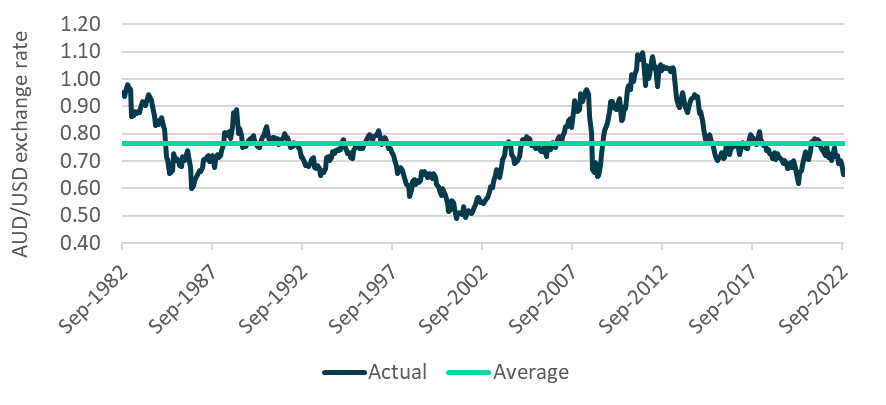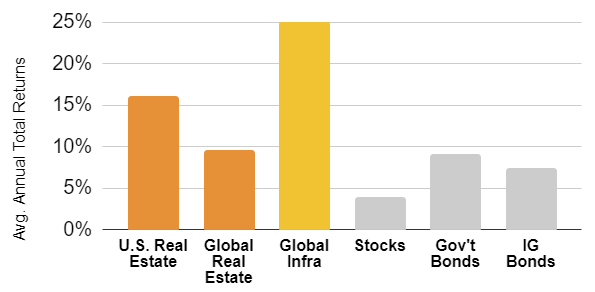Is it a good time for investors to invest in private markets?
In short, yes, we believe it is a good time to invest in private markets.
Sure, we are surrounded by economic and political uncertainty but is there ever a point in time that we are not? We would also argue that because of the long term and illiquid nature of private market investments, investors should look beyond the short term uncertainties and focus on strategies that benefit from secular trends and growth. For most investors, waiting for the right conditions and trying to time the market is fraught with danger.
Nevertheless, in this article we make the case for why it is a good time to invest in private markets by addressing the concerns new private markets investors are currently raising with us.
The current low value of the Australian dollar means overseas assets are more expensive than they were a couple of months ago, why would I buy private market assets when it is expensive?
We’ve all observed the dramatic fall in the value of the Australian dollar (AUD) versus the US dollar (USD) in 2022. Given a significant proportion of the private markets opportunities available are denominated in USD, such opportunities are 16% more expensive in AUD terms as at 20 October 2022 than at the start of the 2022 calendar year, all else being equal.
We’re not currency experts, but given the interest rate guidance in the US versus Australia (i.e. more interest rate increases are expected in the US than Australia), it is probably more likely than not that the AUD/USD exchange rate could fall further in the short term. Then as the AUD/USD exchange rate reverts back to its long term average (which it has the habit of doing) it would become a drag on the investment performance of those USD-denominated private markets assets.
.png)
Source: RBA ((VIEW LINK))
We note however, that the relatively lower value of the AUD versus the USD is not a concern isolated to private markets investors and we do not believe it should be a barrier to investing in private markets. Rather we would suggest that diversified investors (as we all should be!) consider their currency exposures at the total portfolio level.
This means investors should include their private markets exposures in their assessment of how much currency they want to be exposed to.
For example, most investors will have an allocation to international shares with a proportion that is hedged back to AUD and the remaining proportion being currency unhedged (this split is referred to as the currency hedge ratio). Investors should include the foreign currency denominated private markets exposures in the currency unhedged proportion. Thus, the fact that the private markets assets are in USD becomes irrelevant. Investors can maintain their preferred currency hedge ratio (assuming that the preferred currency hedge ratio is not 100% hedged) by increasing their exposure to hedged international shares and simultaneously reducing their exposure to unhedged international shares.
Inflation around the world is running hot, do private markets investments provide protection?
Private infrastructure and real estate (i.e. real assets) are the go-to asset classes for inflation protection.
This is because many infrastructure assets (particularly the regulated/contracted types such as utilities, toll roads, airports etc.), and some real estate assets (e.g. commercial and industrial) have inflation indexation built into their revenue streams (I’m sure the motorists out there notice the toll fees regularly increasing).
So as long as inflation rates outpace interest rate increases, then these types of private real assets are expected to perform relatively well during inflationary periods (note that interest rates influence the discount rates used to value private real assets; rising discount rates put downward pressure on the value of infrastructure assets and vice versa). The chart below shows how real assets have outperformed other asset classes during periods of low growth (defined as US GDP growth is less than 2.5%) and high inflation (defined as US CPI is greater than 2.5%) since 2001.

Beyond the obvious ‘private real assets’ response, private market strategies that focus on investments with the ability to pass inflation/rising input costs through to end consumers without a material drop in the demand for their products and services (i.e. inelastic demand) are expected to perform better during inflationary periods.
Even multi-family real estate (i.e. residential apartments) in locations with strong population growth offer some inflation protection as landlords are able to increase rental income while vacancy rates remain low and wages growth accompany the price inflation.
These are just some of the opportunities that may provide some inflation protection, and as always getting diversified exposures will be key to constructing an appropriate private markets allocation.
What about a recession? Will private markets investments survive or thrive?
Strategies that work well during inflationary periods also have the potential to perform well during recessions.
However, the key is to determine whether the underlying assets offer essential products and services that are relatively unaffected by downturns in the business cycle (e.g. consumer staples, regulated utilities etc).
It is worth noting that closed-end private markets funds have investment periods that could go as long as five years. This gives private markets managers the flexibility to deploy capital when they believe it is opportune to do so over that five-year period. As a result, they can develop comprehensive plans to create long term value for investors, and also have confidence that they are not overpaying for a new deal. Experienced private markets managers are also now embedding a material contraction in earnings multiples when assessing whether a potential investment is expected to satisfy their target returns.
Finally, investors that are comfortable with risk, may also wish to consider strategies that actively seek to profit from distressed assets (e.g. non-performing loans). However, it is critical that investors seeking such strategies invest with professional managers that have experienced investing across multiple investment cycles including periods of distress such as the GFC.
Conclusion
The currency, inflation, and recession concerns of investors are real and justified. However, as long as investors have access and are able to construct a suitably diversified private markets exposure (across experienced managers, strategies, asset classes, geographies, sectors, vintage years etc.) managed by professional managers, we believe the potential for additional returns, improved diversification, and lower return volatility of private markets opportunities outweigh those concerns.
3 topics

